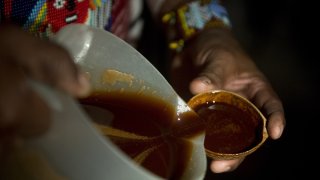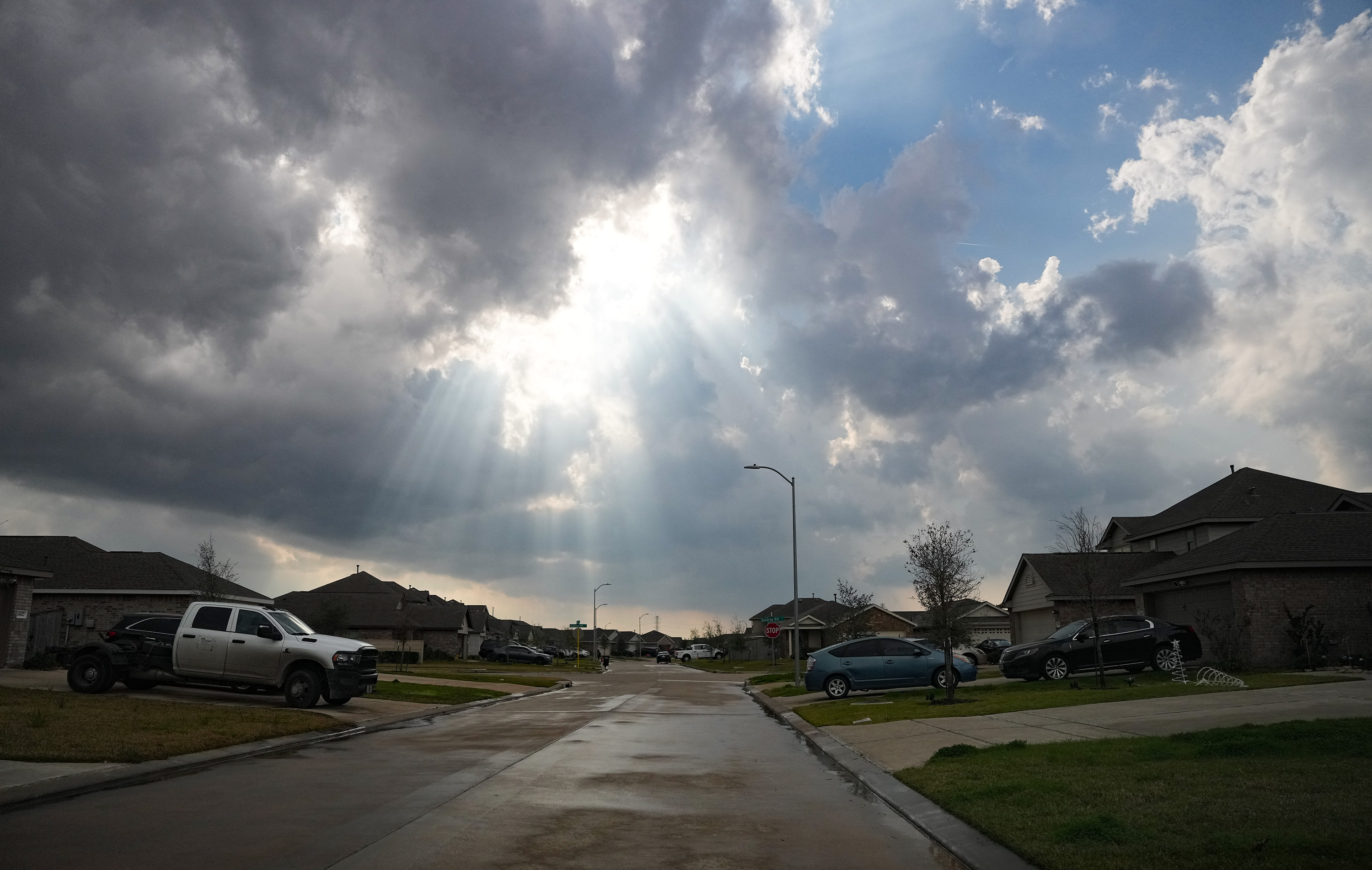
Ayahuasca is a psychedelic tea whose roots go back hundreds of years to ceremonial use by Indigenous groups in the Amazon region.
It's widely used in South America where it is legal in several countries, including Peru and Brazil. But in the United States, it remains illegal because the brew contains the psychedelic N, N-Dimethyltryptamine or DMT.
Despite its illegal status, ayahuasca has become increasingly popular in the U.S., and interest has intensified as celebrities like NFL quarterback Aaron Rodgers and Hollywood star Will Smith talked about attending ceremonies. Supporters have formed churches to hold their ceremonies, which are largely held underground in homes, at rented facilities or in remote locations like deserts.
WHAT HAPPENS WHEN YOU TAKE AYAHUASCA?
Get top local stories in Southern California delivered to you every morning. >Sign up for NBC LA's News Headlines newsletter.
Those who drink ayahuasca report seeing shapes and colors and going on dream-like journeys that can last several hours. Some say they can encounter dead relatives as well as friends and an assortment of spirits who talk to them.
Surveys of tea drinkers have reported that most experience a range of physical and mental effects after drinking ayahuasca. The most common physical reaction, according to a study in PLOS Global Health, was vomiting or nausea while other lesser side effects include abdominal pain and headaches. A majority of participants also reported seeing and hearing things, feeling alone or having nightmares — though almost all those reporting mental effects felt they were beneficial to their growth. According to the study, 2.3% of those surveyed reported needing medical attention after taking ayahuasca.
U.S. & World
News from around the country and around the globe
CAN AYAHUASCA HELP WITH DEPRESSION AND ANXIETY?
A growing number of people in the United States are turning to ayahuasca to address a range of mental ailments they say conventional medicine has failed to remedy.
Many turn to the ceremonies to help with eating disorders, depression, substance use disorders and post-traumatic stress. One study, using data from the Global Ayahuasca Project, reported that most people with depression felt it had “very much improved” or “completely resolved,” while most of those with anxiety reported that their symptoms were “very much improved” or “completely resolved.”
But medical experts caution that not enough research has been done in the United States to confirm these findings — though smaller studies have been done in Brazil and other countries.
“There aren’t really the same kinds of studies that have been done above ground in the United States that allow us to know how well does it really work, who does it really work the best for, what are the real side effects of it,” said Anthony Back, a professor of medicine at the University of Washington School of Medicine in Seattle. He is leading a study using psilocybin, a hallucinogen found in some mushrooms, to help doctors and nurses with symptoms of depression and burnout linked to their work during the pandemic.
“Our knowledge (of ayahuasca) is kind of limited,” he said. “There is not as much information about safety as the regular other medical treatments that you might get if you went to a regular doctor in the United States. It’s kind of in the early stages I would say — interesting, intriguing, promising.”
WHAT ARE THE CONCERNS ABOUT AYAHUASCA?
Some supporters worry the popularity of ayahuasca could prompt a federal government crackdown. Some advocates have reported ayahuasca shipments from South America being seized and churches closing for fear of legal trouble. Others worry reports of sexual assaults at ceremonies, sickened participants or organizers ripping off people could prompt the federal government to act.
Some groups have formed churches in the hopes of being protected from prosecution by a 2006 U.S. Supreme Court ruling. Citing the Religious Freedom Restoration Act, a New Mexico church won the right to use ayahuasca as a sacrament. A subsequent lower court decision ruled Oregon branches of a different ayahuasca church could use it.
The U.S. Drug Enforcement Administration, which declined to comment for this story, set up a system in 2009 for churches to be recognized as having an exception to the Controlled Substances Act. But Sean McAllister, who represents an Arizona church in a lawsuit against the federal government after its ayahuasca from Peru was seized at the Port of Los Angeles, said no churches have been approved. Most people in the movement, he said, view that option as “a complete waste of time."
“The government wants to keep a lid on this thing. They want to keep it as small as they can,” said McAllister, adding that the DEA would be skeptical of people claiming ayahuasca connects them to God.
COULD THE US DECRIMINALIZATION AYAHUASCA?
Some supporters hope moves to decriminalize ayahuasca and other psychedelics in several states will reduce the risk of prosecution. Decriminalization efforts have succeeded in Colorado and Oregon and a bill is pending in California. More than a dozen cities — mostly in California, Massachusetts and Washington — have passed resolutions that deemphasize the prosecution of various drugs including ayahuasca.
“Part of what we are trying to do is get the word out and change the laws in the United States so this is 100% legal and you never have to worry about it,” Brian Cantalupi, a lead facilitator with the California-based Hummingbird Church, told participants at a recent ayahuasca ceremony. The church, which once largely operated underground, now holds ceremonies in the open.
But it’s unclear if the new laws sanction ayahuasca ceremonies. Even if they did, participants could still face federal prosecution.
“From the perspective of Colorado, it does seem under the new law that people can get together and share ayahuasca but the question is how much are they allowed to have. That is not clear,” said Mason Marks, the senior fellow of a psychedelics project at the Petrie-Flom Center at Harvard Law School. “It doesn’t mean that it’s a free for all and people can do what they want. There are still a lot of restrictions.”



